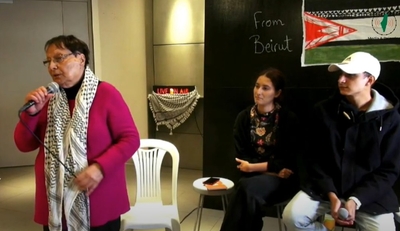 (YouTube image) Leila Khaled speaks to students earlier this month at Lebanese American University. |
Khaled hijacked a TWA flight from Rome to Tel Aviv in 1969 on behalf of the Popular Front for the Liberation of Palestine (PFLP), diverting the plane to Damascus. She then hijacked an El-Al flight from Amsterdam in 1970. An accomplice, Sandinista comrade Patrick Arguello, was killed by Israeli air marshals in an in-flight scuffle.
Though she came to fame more than five decades ago, anti-Israel actors today can't seem to get enough of her story. In addition to the LAU talk, Khaled further detailed her terrorist escapades during an interview with Breakthrough Media journalist Rania Khalek. The interview was posted on YouTube Dec. 6.
Khaled's campus and other online lectures have generated protests in recent years. Online meeting sites and social media pages have blocked or removed several events. This happened at San Francisco State University (SFSU) and the University of California, Merced.
So far, however, the talks remain available even though YouTube's guidelines explicitly state: "Content that violates our policies against violent extremism includes material produced by government-listed foreign terrorist organizations."
The United States designated the PFLP as a terrorist group in 1997.
Although Khaled continued to advocate violence – she calls it "resistance" – and praised the PFLP, her two appearances this month remain on YouTube. "It's our duty to resist," she told Khalek. "... So it was my dream to hold arms, and I held arms."
At the LAU event, Khaled described how she joined the PFLP and was tapped for the hijacking.
"So we went to the airport, I had...[a] bomb, it's TNT, 10 kilos...I had hand grenade, it was in my pocket, and a pistol," Khaled said.
Though a private university, LAU is among the recipients of a $50 million USAID financial aid grant announced last month.
History has seen "colonizers" who "left because of resistance of the Palestinians," Khaled said. The students represent the next generation who "will do your best to turn back the stolen land for a people who is waiting for their return."
Khaled was slated to appear at a September SFSU Beirut conference titled Memorializing the Sabra & Shatila Massacre: Bearing Witness, Resilience, & Accountability, along with Sami Al-Arian who served on the Palestinian Islamic Jihad's governing board. YouTube removed those videos.
SFSU's September conference was moderated by Professor Rabab Abdulhadi, who has organized a number of online seminars with Khaled. Abdulhadi has written that she "wanted to grow up to be another Leila Khaled."
Abdulhadi previously hosted and invited Khaled to speak virtually at SFSU, but the event was ultimately canceled after the webinar platform Zoom received pushback for hosting Khaled.
More than 53 years after hijacking passenger airliners, Khaled continues to be treated as a "feminist icon" and a big-hearted one at that.
"We don't want to hurt you," she said about the passengers on her hijacked flights. "We don't want to hurt anybody. We want to release our [PFLP] prisoners in our homeland."
Khaled's efforts, however, have failed.
Her two plane hijackings resulted in no prisoner releases. Furthermore, her frequent contention that she "never hurt anybody" was not for a lack of trying. During her second hijacking, Khaled pulled the safety pin from one of the grenades she carried and rolled it down the aisle towards the economy class passengers. Miraculously, the grenade did not explode.
Relishing her iconic status as the first female terrorist, Khaled spoke about the challenges of being a female terrorist in a male-dominated field.
"And because I'm a woman, I feel that our struggle is double than what men do because we face two things," Khaled said. "We face the enemy itself, and we face also the old traditions that will hinder women from being active for their homeland."
She recounted with amusement how the Damascus officers were confused about who hijacked the 1969 flight because she was a woman.
One of the more chilling moments in her LAU speech came when Khaled chuckled as she described an interaction with a passenger just prior to boarding the plane.
"He said, 'I'm Greek, and for 15 years I was in Chicago. Now I'm coming to see my mother,'" Khaled said. "I looked at him and turned my face. What shall I tell this man? Go out?"
Half a century after her hijacking, Khaled remains bitterly opposed to any peaceful coexistence, or any negotiated settlement with Israel. Liberation, she said, "means to fight until you let the occupants leave...[we] who are going to come back to return there, we decide the future of this land."
Khaled also told Khalek that Israel is a state that shoots to kill Palestinians every day, "killing people in the streets and trying to suffocate them from even brea[thing] oxygen in their places." Khaled also called Israel an apartheid state and accused Israel of being a "genocide project."
Unrepentant terrorist doesn't even begin to describe her.
Teri Blumenfeld and Ariel Behar are IPT research analysts.
Copyright © 2022. Investigative Project on Terrorism. All rights reserved.


